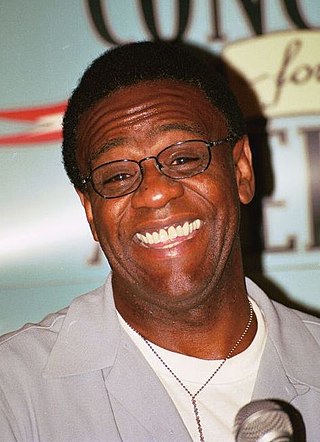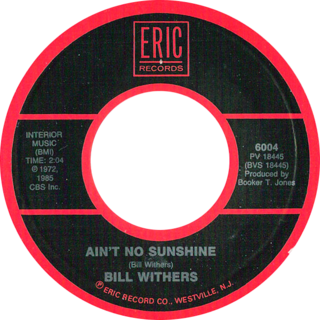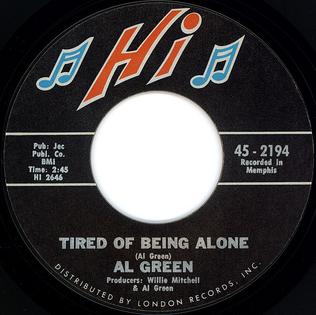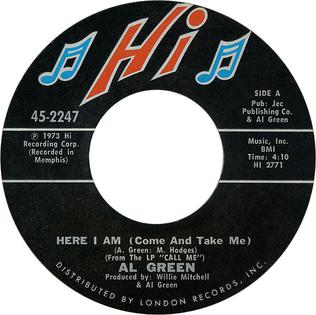Related Research Articles

Albert Leornes Greene, known professionally as Al Green, is an American singer, songwriter, pastor and record producer best known for recording a series of soul hit singles in the early 1970s, including "Take Me to the River", "Tired of Being Alone", "I'm Still in Love with You", "Love and Happiness", and his signature song, "Let's Stay Together". After his girlfriend died by suicide, Green became an ordained pastor and turned to gospel music. He later returned to secular music.

Martha and the Vandellas were an American vocal girl group formed in Detroit in 1957. The group achieved fame in the 1960s with Motown.

Earth, Wind & Fire is an American band whose music spans the genres of jazz, R&B, soul, funk, disco, pop, Latin, and Afro-pop. They are among the best-selling bands of all time, with sales of over 90 million records worldwide.

"Let's Stay Together" is a song by American singer Al Green from his 1972 album of the same name. It was produced and recorded by Willie Mitchell, and mixed by Mitchell and Terry Manning. Released as a single in 1971, "Let's Stay Together" reached number 1 on the Billboard Hot 100, and remained on the chart for 16 weeks and also topped Billboard's R&B chart for nine weeks. Billboard ranked it as the number 11 song of 1972.

"I Can't Get Next to You" is a 1969 No. 1 single recorded by the Temptations and written by Norman Whitfield and Barrett Strong for the Gordy (Motown) label. The song was a No. 1 single on the Billboard Top Pop Singles chart for two weeks in 1969, from October 18 to October 25, replacing "Sugar, Sugar" by the Archies and replaced by "Suspicious Minds" by Elvis Presley. The single was also a No. 1 hit on the Billboard Top R&B Singles for five weeks, from October 4 to November 1, replacing "Oh, What a Night" by the Dells, and replaced by another Motown song, "Baby I'm For Real" by the Originals.

"Ain't No Sunshine" is a song by Bill Withers, from his 1971 debut album Just As I Am, produced by Booker T. Jones. The record featured musicians Donald "Duck" Dunn on bass guitar, Al Jackson Jr. on drums and Stephen Stills on guitar. String arrangements were done by Booker T. Jones. The song was recorded in Los Angeles, with overdubs in Memphis by engineer Terry Manning.

"Boogie Wonderland" is a song by American band Earth, Wind & Fire with the Emotions, released in April 1979 on Columbia Records as the first single from their ninth album, I Am (1979). The song peaked at number 14 on the US Billboard dance chart, number six on the Billboard Hot 100, and number two on the Billboard Hot Soul Singles chart. It was certified gold in the US and platinum in the UK. "Boogie Wonderland" was Grammy nominated in the categories of Best R&B Instrumental Performance and Best Disco Recording. It won the Grammy for Best R&B Instrumental Performance.

"The Way You Move" is a hip-hop and soul song by the American hip hop duo OutKast, performed by its member Big Boi. The song features OutKast mentor Sleepy Brown on guest vocals. Along with "Hey Ya!", recorded by OutKast's other member André 3000, "The Way You Move" is one of the two lead singles from Speakerboxxx/The Love Below, OutKast's double album project that includes a solo album from each member.

"Tired of Being Alone" is a soul song written by American singer Al Green. It reached number 11 on the Billboard Hot 100 and number seven on the Soul Singles Chart in 1971. Billboard ranked it as the number 12 song for 1971.

"Green Onions" is an instrumental composition recorded in 1962 by Booker T. & the M.G.'s. Described as "one of the most popular instrumental rock and soul songs ever" and as one of "the most popular R&B instrumentals of its era", the tune is a twelve-bar blues with a rippling Hammond M3 organ line by Booker T. Jones that he wrote when he was 17, although the actual recording was largely improvised in the studio.

"Fire" is a song by R&B/funk band Ohio Players. The song was the opening track from the album of the same name and hit No. 1 on both the Billboard Hot 100 and the Hot Soul Singles chart in early 1975. It spent two weeks atop the soul chart. "Fire" was the Ohio Players' only entry on the new disco/dance chart, where it peaked at No. 10. The song is considered to be the band's signature song along with "Love Rollercoaster".
"You Ought to Be with Me" is a song by Al Green. Released from his album, Call Me, the single spent a week at number one on the Hot Soul Singles chart. It was also successful on the pop chart, peaking at number three on the Billboard Hot 100 singles chart in late 1972. It sold over one million copies and was certified gold by the RIAA.
"Livin' for You" is a song recorded by Al Green and co-written by Green and Willie Mitchell. It was the title track of Green's 1973 album Livin' for You. Released as a single in December of that year, it eventually became Green's fourth single to reach the number one spot on Billboard's R&B Singles Chart, also reached the number nineteen spot on Billboard's Pop Singles Chart. The single was Al Green's first release without the involvement of drummer Al Jackson, Jr., who had reunited with his former group, Booker T. & the MG's.

"Turn It Up (Remix) / Fire It Up" is a song by American rapper Busta Rhymes. It was released as the fourth and last single from his second studio album, When Disaster Strikes... (1997), and as the second single from the Can't Hardly Wait soundtrack on May 15, 1998, by Flipmode Entertainment and Elektra Records. The song was written and produced by Busta Rhymes, and contains co-production by Flipmode Squad member and Busta's hype man Spliff Star.
"L-O-V-E (Love)" is a 1975 Soul single by Al Green. The single was produced by Willie Mitchell, who also co-wrote the song along with Al Green and Mabon Hodges. The single was from the LP Al Green Is Love and continued a string of number one R&B hits throughout the 1970s.
"Funny How Time Slips Away" is a song written by Willie Nelson and first recorded by country singer Billy Walker. Walker's version was issued as a single by Columbia Records in June 1961 and peaked at number 23 on the Hot C&W Sides chart. The song has been featured in several live action films and television shows, such as in the first episode of the second season of AMC’s Better Call Saul and in the 2020 Netflix drama The Devil All the Time.
"For the Good Times" is a song written by Kris Kristofferson, first recorded by singer Bill Nash in 1968 before appearing on Kristofferson's own debut album in June 1970. After a recording by Ray Price became a #1 hit single in June of that year, the song established Kristofferson as one of country and popular music's top songwriters while giving Price his first chart-topping country and western song in 11 years.

"Treat Her Like a Lady" is a 1984 single by American vocal group by the Temptations. Released on November 6, 1984 but airplay October 1984, this is the first single on which Ali-Ollie Woodson was lead singer. The song appears on Temptations' album Truly for You, also released in 1984. The song was co-written by Woodson and Otis Williams, and was co-produced by Woodson and former Earth, Wind & Fire member Al McKay and Ralph Johnson.

"Here I Am (Come and Take Me)" is a 1973 song by Al Green, the second single released from his album Call Me. The song reached number 10 on the Billboard Hot 100 and number two on the Hot Soul Singles chart. It was certified as a gold record by the Recording Industry Association of America.
One Way is an American R&B and funk band that was popular in the late 1970s, and throughout most of the 1980s, led by singer Al Hudson. The group's most successful record was "Cutie Pie", which reached number 4 on the Billboard Soul Singles chart and number 61 on the pop chart in 1982.
References
- ↑ Whitburn, Joel (2004). Top R&B/Hip-Hop Singles: 1942–2004. Record Research. p. 438.